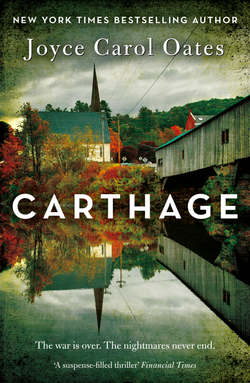Читать книгу Carthage - Joyce Carol Oates - Страница 8
ОглавлениеPROLOGUE
July 2005
DIDN’T LOVE ME ENOUGH.
Why I vanished. Nineteen years old. Tossed my life like dice!
In this vast place—wilderness—pine trees repeated to infinity, steep slopes of the Adirondacks like a brain jammed full to bursting.
The Nautauga State Forest Preserve is three hundred thousand acres of mountainous, boulder-strewn and densely wooded wilderness bounded at its northern edge by the St. Lawrence River and the Canadian border and at its southern edge by the Nautauga River, Beechum County. It was believed that I was “lost” here—wandering on foot—confused, or injured—or more likely, my body had been “dumped.” Much of the Preserve is remote, uninhabitable and unreachable except by the most intrepid hikers and mountain climbers. For most of three days in midsummer heat rescue workers and volunteers were searching in ever-widening concentric circles spiraling out from the dead end of an unpaved road that followed the northern bank of the Nautauga River three miles north of Wolf’s Head Lake, in the southern part of the Preserve. This was an area approximately eleven miles from my parents’ house in Carthage, New York.
This was an area contiguous with Wolf’s Head Lake where at one of the old lakeside inns I’d been last seen by “witnesses” at midnight of the previous night in the company of the suspected agent of my vanishing.
It was very hot. Insect-swarming heat following torrential rains in late June. Searchers were plagued by mosquitoes, biting flies, gnats. The most persistent were the gnats. That special panic of gnats in your eyelashes, gnats in your eyes, gnats in your mouth. That panic of having to breathe inside a swarm of gnats.
Yet, you can’t cease breathing. If you try, your lungs will breathe for you. Despite you.
Among experienced rescue workers there was qualified expectation of finding the missing girl alive after the first full day of the search, when rescue dogs had failed to pick up the girl’s scent. Law enforcement officers had even less expectation. But the younger park rangers and those volunteer searchers who knew the Mayfields were determined to find her alive. For the Mayfields were a well-known family in Carthage. For Zeno Mayfield was a man with a public reputation in Carthage and many of his friends, acquaintances and associates turned out to search for his missing daughter scarcely known to most of them by name.
None of the searchers making their way through the underbrush of the Preserve, into ravines and gullies, scrambling up rocky hillsides and climbing, at times crawling across the mottled faces of enormous boulders brushing gnats from their faces, wanted to think that in the Adirondack heat which registered in the upper 90s Fahrenheit after sunset a girl’s lifeless body, possibly an unclothed body on or in the ground, sticky with blood, would begin to decompose quickly after death.
None of the searchers would have wished to utter the crude thought (second nature to seasoned rescue workers) that they might smell the girl before they discovered her.
Such a remark would be uttered grimly. Out of earshot of the frantic Zeno Mayfield.
Shouting himself hoarse, sweat-soaked and exhausted—“Cressida! Honey! Can you hear me? Where are you?”
He’d been a hiker, once. He’d been a man who’d needed to get away into the solitude of the mountains that had seemed to him once a place of refuge, consolation. But not for a long time now. And not now.
In this hot humid insect-breeding midsummer of 2005 in which Zeno Mayfield’s younger daughter vanished into the Nautauga State Forest Preserve with the seeming ease of a snake writhing out of its desiccated and torn outer skin.
